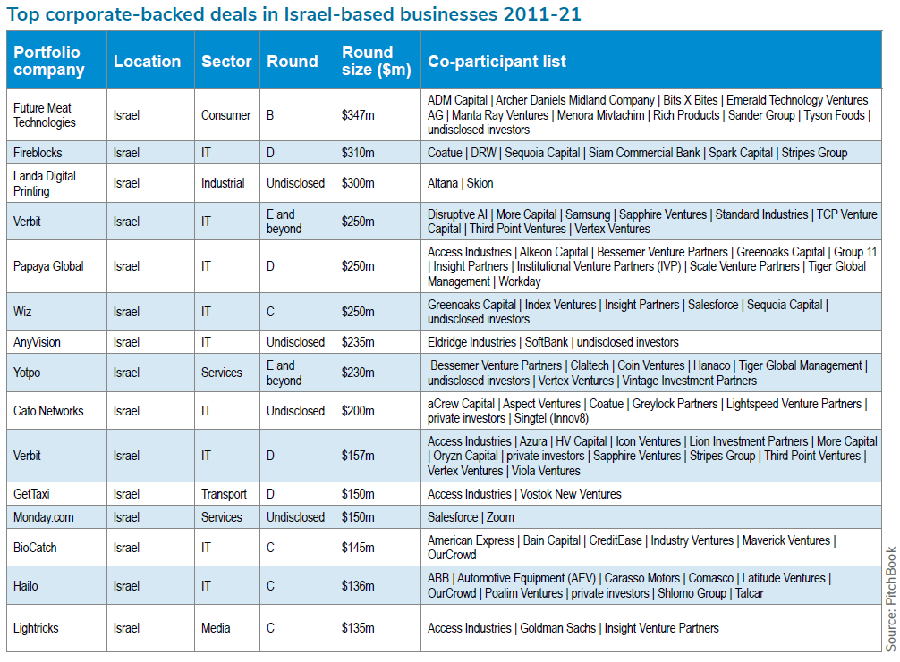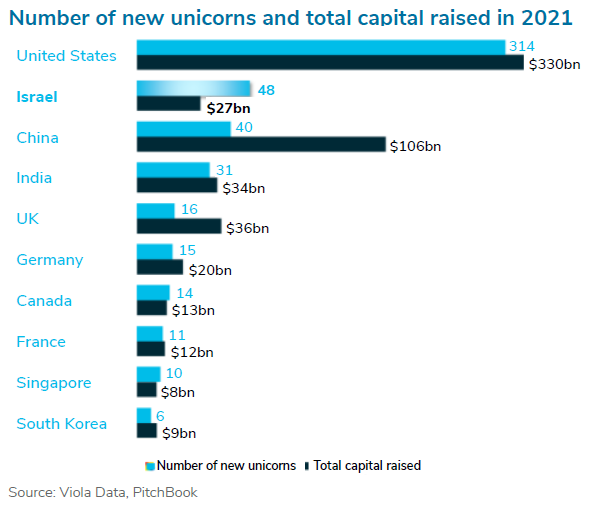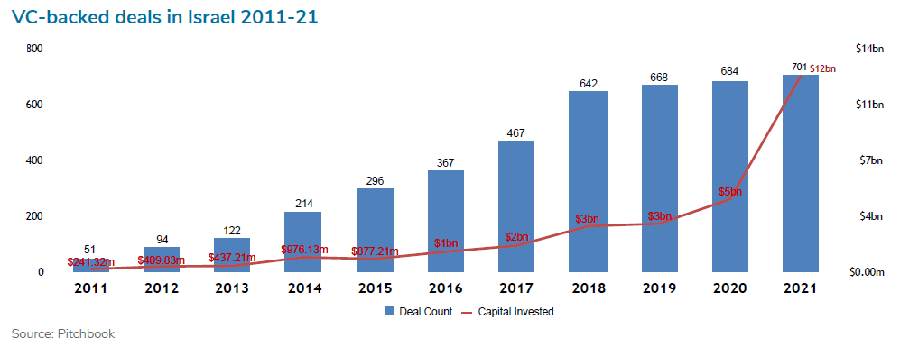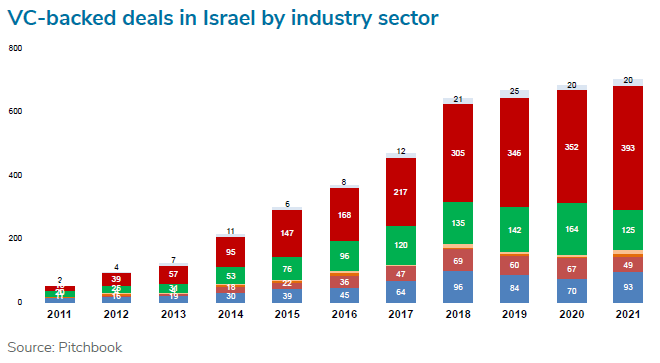Israel has the largest number of startups per capita in the world, according to consulting firm Deloitte, which explained that factors such as Israel’s creative and flexible society and culture, technology entrepreneurs and investors’ global-first approach, strong economy and government support are contributing to the ecosystem’s success.
The country also produces the highest number of engineers per capita and has the world’s second-highest research and development (R&D) spending as a percentage of the gross domestic product (4.3%), Deloitte added in its article, The Israeli Technological Eco-system.
David ‘Dede’ Goldschmidt, Israel-based vice-president, managing director and head of Samsung Catalyst Fund (SCF), a corporate venture capital (CVC) vehicle for South Korea-headquartered consumer electronics conglomerate Samsung, pointed out several key attributes that make Israel unique within the worldwide startup community.
Goldschmidt said: “An entrepreneurial culture – Israelis tend to be practical and agile in their problem-solving attitude, seeking ways for fast implementation of new concepts and technologies. They are open to taking calculated risks and being the first to operate in blue ocean, emerging domains. Considering the limited size of the local market, entrepreneurs adopt a global-first approach when launching new ventures.
“Relevant knowledge and expertise – The brightest minds that served in the Israeli Defence Forces have access to leading-edge technology and opportunity for high scale implementation. This active and vibrant local tech scene has thousands of funded startups and more than 350 multinationals’ R&D centres. Academia also plays a prominent role in Israel’s startup culture with multiple, strong domains, such as AI and particularly computer vision – the foundation for Mobileye. Other leading applications areas include cyber security, cloud & datacentre, 5G, sensors and automotive. All these market segments are of interest to the Samsung Catalyst Fund.
“Culture – In general, Israelis have lower fear of failure. Failure provides another chance to learn a lesson and try again. It is not uncommon for most startups to fail or at least not be successful. Typically, nine out of ten startups do not succeed. It is important to be in a culture that appreciates the experience gained in previous attempts gained by serial entrepreneurs.”
For these reasons, many foreign VCs are interested in Israel, Goldschmidt added. “In fact, more than 70% of the direct investments in Israel are by foreign investors, whereas in Europe, traditionally the majority of capital invested is local. To put this in perspective, the magnitude of venture funding in Israel alone exceeds most larger European nations.”
Israel is probably only second to Silicon Valley with regards to the overall maturity of its venture ecosystem, Goldschmidt continued. “Early in the 2000s, Israel had strong sources for early-stage financing; however, it lacked the capital needed to fund growth. This resulted in early exits at relatively lower valuations.
“Over the past decade, we have seen many growth-stage investors attracted to Israel, allowing liquidity to the early investors and growth capital to the companies to fuel their growth and scale. Israel now has more than 60 unicorn startups. Being listed on the Nasdaq or NYSE has become a popular exit strategy, whereas before, acquisition was the main exit path for most startups.
“Samsung Catalyst Fund and many of the other CVCs have a strong presence in Israel when compared with other regions in the world. Their presence provides the potential for both strategic collaboration as well as potential M&A sourcing.”
Irad Dor, an Israel partner for US-based software supplier Microsoft’s corporate venturing arm, M12, added: “There is an exceptionally strong sense of collaboration between ecosystem players in Israel, significantly higher than in Europe and to some extent in Silicon Valley. You could easily find examples of multinationals cooperating within the local ecosystem to benefit individual startups, common social projects, or even the ecosystem as a whole.
“Due to the size and connectedness of Israel’s technology ecosystem, and the constant flow of talent between multinational corporations (MNCs), startups, the military and academia, the relative volume of multidisciplinary technology innovation in the country tends to be higher.
“Having a very small local market, Israeli startups are global from day one, which provides a unique opportunity to MNCs to interact with them from early on and influence their journey.”
Joseph Kowen, an Israel venture partner for Evonik Venture Capital (EVC), the strategic investment subsidiary of Germany-listed speciality chemicals provider Evonik Industries, also said: “Israel is a compact country with a small population. A large percentage of the academic, research, corporate and entrepreneurial activity takes place in a narrow strip of the country from Beersheba in the south to Haifa in the north. Israelis tend to be highly networked, so non-confidential information travels quickly among people. The effect is that a particularly hot area of startup activity finds its way around the country very efficiently.
“Israelis are willing to try new things, take some risks, and while driven to success are not intimidated by failure. They learn from mistakes, pick themselves up, and go to work again. Driven by the natural proclivity of Israelis to network, digital tools and platforms such as WhatsApp are established and used with great ease. News is shared almost instantaneously. As a result, new and hot technologies and opportunities become well known rapidly across the ecosystem. One example of this is the foodtech area, which over the past year has made substantial progress and is considered one of the hottest and fastest-growing tech segments in the country, both in the growth of the number of ventures entering the space and the amount of money that is available for investment in this space.”
Additionally, he said academia and the tech community often work hand-in-hand, elevating serious but basic research easily to applied research to take the idea to market in some form, which explains the high level of activity among technology transfer organisations of all the main research institutions.
Kowen added: “Academic researchers are frequently tempted to try their hand at entrepreneurship and there are numerous instances where they have made an easy transition from the campus into the high-tech world. Graduate students can end up being employees in startups that are set up to commercialise the research on which they worked while studying. Using foodtech as an example again, several of the country’s leading cultured meat companies are closely allied with university research programmes. Future Meat was founded by Prof Yaakov Nahmias from the Hebrew University, and Prof Shulamit Levenberg from the Technion Israel Institute of Technology was a co-founder of Aleph Farms.”
Israelis are very international in their activities, Kowen pointed out. “As a very small country with a high percentage of immigrants, Israeli tech entrepreneurs are well-connected internationally and think globally from day one. Technology companies easily establish contact with their counterparts from other countries. The ecosystem here is enriched with contacts from around the world and one can find investors, collaborators and business partners from a range of countries all active here.”
Jacob Bryce, CEO of Israel Venture Partner – which invests in local startups on behalf of ABB Technology Ventures, Henkel Ventures and Inven Capital, respective corporate venturing vehicles for industrial automation technology producer, chemical producer Henkel and energy utility CEZ – said Israel is differentiated from the other main VC ecosystems by the following characteristics.
“Its orientation towards deeptech and science spanning AI, signal processing and semiconductor to material science to genetics. Even the business-to-consumer (B2C) companies tend to be based on deeptech rather than just new business models – such as Waze, with its underlying mathematics-based traffic mapping.”
The sheer density of startup innovation, with its quantity of startups approaching that of all of Europe in an area the size of Greater London, is also another impressive feature of Israel, Bryce said, and the compactness contributes to its interconnectedness. “The entire ecosystem is just two phone calls away, from the leading professors to the CVCs to the private investors and VCs.”
The presence of global actors also makes Israel unique, Bryce noted, pointing out that more global corporates and CVCs are present in Israel than in any other place outside the United States.
Israel ranked 15th among the world’s most innovative economies in the Global Innovation Index 2021 and is the most innovative economy among northern African and western Asian nations.
In terms of median VC post-money valuation, 2021 was also a remarkable year – with PitchBook recording nearly $33.2m compared with $20.2m the previous year and $14.1m in 2019.

SCF’s Goldschmidt explained the innovation scene’s development: “The ecosystem has matured quite significantly in the past years. This has translated to larger Israeli startup companies with larger exits. For several years in a row, Israel saw record-breaking venture investments with $8bn in 2019, $10.5bn in 2020 and dramatic growth to almost $26bn total venture investments in 2021, with $22bn worth of exits, according to Meitar-IVC monitor. Venture growth was pronounced across all stages from early to late. Players such as Insight Partners and Tiger Global are taking centre stage. We see more and more serial entrepreneurs, forming their third or fourth company, seeking this time to build category leaders.
“In addition, working closely with entrepreneurs over the past decades, we are seeing a maturity of newer and younger entrepreneurs. In the past, Israelis had a great understanding of engineering and technology and usually hired experienced business executives from abroad. That has changed. Today, even young entrepreneurs in their 20s talk about business models, product-market fit and go-to-market strategies. If nothing else, the covid-19 pandemic has taught us that business can be carried out without face-to-face meetings and commercial deals and even investments can be done remotely. This has helped Israeli startups to remain headquartered in Israel without having to set up offices in other regions worldwide.
“Taking a long-term view, we see how Israeli talent has adjusted to serve demand, following ‘hype cycles’. Back in the 90s, the Israel ecosystem had strong telecom and wireless systems startups such as Breezecom and others. In the early 2000s, we saw a rise in storage and networking subsystems and chipsets from startups such as XIV, Passave and Broadlight. The second decade of this century has brought a strong rise in cyber security, adtech and internet or mobile startups, with companies such as Waze, Wix and Trusteer. Later came the automotive and AI wave with companies such as Innoviz (globally leading automotive LiDAR, now public) and Habana Labs (an AI chip developer, which was acquired for $2bn) – both portfolio companies of the Samsung Catalyst Fund.


“It is also worth noting the emergence of data and AI-driven startups. Data-driven innovation is disrupting many verticals, such as fintech.”
Significant deals from the past few years have included rounds for Future Meat Technologies, Fireblocks, Landa Digital Printing, Verbit, Papaya Global, Wiz, AnyVision, Yotpo, Cato Networks and Verbit, among others.
Mobileye, IronSource, Habana Labs, Checkmarx and XM Cyber were among the most notable Israel-based companies that have helped corporates score exits, as were Monday.com, GuardiCore, Anobit, Spot (Spotinst) and Annapurna Labs.
M12’s Dor added: “Until recently, Israel was a startup nation where startups were acquired for $100m to $200m by multinationals. In recent years, however, it has become a monstrous scale-up nation and Israeli founders produce unicorns at an unparalleled per-capita rate.

“A few dozen privately held Israeli founded startups have crossed the $1bn mark in 2021 alone. In 2021 Israel created more unicorns than China and is second only to the US. Today, Israeli founders make Israel the country that produces the highest number of per-capita tech unicorns.
“Our investment approach in Israel is aiming to invest in startups with a real chance to become unicorns. Two emerging startup categories are picking up in Israel recently – the first is HRtech – with several unicorns minted in the last year and the second is gaming. M12 recently invested in both verticals with our investments in GrowthSpace, which is democratising coaching and employee development, and in an innovative gaming platform in stealth mode.”
EVC’s Kowen agreed and said: “There has always been a high level of innovation in Israel from early days with the founding of companies such as Scitex, Elbit and Elscint. There has been a dramatic growth in recent years in the number of startups entering the ecosystem. This has affected the number of CVCs active here. Startup Nation Central lists 45 foreign CVCs active in Israel, of which 14 have become active in the past four years.
“With the growth in the number of startups, more money has become available. The year 2021 saw not only a record amount of venture funding becoming available, but extremely high growth from the year before. $27bn was invested in 2021, up from $12.2bn the year before. This amount was driven by large deals: 26 deals raising $100m or more were closed in 2021. The number of so-called unicorns in Israel grew to 48, second only to the United States. The hot areas for large rounds have been security, fintech, IT and retail technologies. Healthcare and foodtech have grown as well, although they still constitute only a small percentage of the total investment in the ecosystem.”
PitchBook data logged 701 corporate-backed deals reaching almost $12.3bn in total volume, up from the $4.6bn figure the year before across 684 deals.

Similar to prior years, the IT sector was dominant in the country in 2021, followed by healthcare, B2B and B2C technologies.
Kowen continued: “The growth in the size of the funding rounds does present some challenges to CVCs, since the higher valuations mean that CVCs end up holding a smaller percentage of the venture. However, since Evonik’s purpose in making the investment, similar to many CVCs, is to produce strategic value for the company’s business lines. The percentage of the company held after an investment is not the critical factor in a decision to make an investment.
“The growth in activity in Israel has been a driver of EVC’s increasing interest in connecting with the Israeli ecosystem. That said, EVC’s focus areas are a relatively small part of the total investment pie in Israel. Evonik’s innovation growth fields are additive manufacturing, advanced food ingredients, cosmetic solutions, healthcare solutions, membranes, sustainable nutrition and digital aspects of these fields.
“Some areas of interest for EVC that are targeted in Israel are smart coatings and additives, personalised skincare, additive manufacturing and 3D printing, microbiome-related innovations, tissue engineering, and precision livestock management. The dispersion and broadening of the ecosystem present opportunities for EVC. which is mostly interested in startups that are developing B2B technologies and products. EVC also seeks out investments in technologies with a focus on sustainability.”

Israel Venture Partner’s Bryce gave a similar perspective, saying that the scale of Israeli tech investment has exploded, growing from $7bn in 2019 to $10bn in 2020 to $26bn in 2021. “In parallel, Israel has evolved from a producer of early-stage startups that are acquired early to a source of large global companies, such as Wix, Monday.com, JFrog, Wiz and CyberArk.”
Bryce added that the traditional sectors of cyber, DevOps, enterprise software and AI are hot topics in Israel; moreover, fintech and industry 4,0 have developed extraordinarily over the last few years. “In addition, many of the scientific sectors are experiencing strong growth, from medtech to semicon to advanced materials and spacetech.”
Similar to Australia, China and Malaysia, Israel also runs state-owned venture funds with some of the earliest government-led VC vehicles. Yozma – which means initiative in Hebrew – was formed in 1993 to provide tax relief designed for foreign VC schemes operating in the country and to help boost their deals with public money.
Another example is the Israel Innovation Authority’s Incubators Program, which invests millions of dollars in high-tech entrepreneurs who are building innovative startups.
Dor, who joined M12 in March 2021 to focus on early-stage investments in cloud infrastructure, cybersecurity and enterprise software in the country, said: “M12 is highly collaborative and financially driven, working to help support our portfolio companies and the local ecosystem in general. We share deal flow with partner VCs and have networked with local accelerator programmes to best stay connected to the next wave of homegrown, visionary startup leaders.”
He was a director for nearly six years at telecommunications firm SingTel, first at Sing Innovation Centre in Israel and Europe before joining its corporate venturing unit, Innov8 VC. He then joined Eight Roads, a subsidiary of financial services and investment group Fidelity, as a venture partner where he spent almost three years from 2018.
Kowen said: “EVC began looking at investments in Israel some years back as interesting opportunities were presented to the company through its international network in the business, investment and technology communities.
“As open innovation is key for Evonik, in 2017 the company decided to upgrade its activities through the appointment of Lars Böhnisch as the executive responsible for EVC’s investment activities in the country. He began visiting the country regularly and through his visits, he established connections with VCs, CVCs, government representatives and universities in the country.”
In April 2020, EVC appointed Kowen as the local venture partner in Israel, and he has continued the task of building connections with key players in the ecosystem that are relevant for EVC’s areas of interest. The company has made two investments in Israel and collaborates closely with local VC funds and investors as it accompanies them in their technological and commercial development.
Starting this year, interesting opportunities in healthcare for EVC are also being screened by Ariel Dayan, whose main role is serving as local commercial business manager for two of the company’s business lines. Interesting opportunities and contacts are processed and screened by Kowen and Dayan locally to see if they fit the company’s investment priorities. Promising opportunities are reported back to the EVC team in Germany, which presents them to the relevant business lines to get feedback and gauge their interest.
To date, EVC has made two investments in Israel and collaborates closely with local VC funds and investors as it accompanies them in their technological and commercial development. In both these cases, EVC continued to support the portfolio with follow on investments. The companies are Velox, a maker of printing equipment for the packaging industry, and Castor, an additive manufacturing software company.
Israel is characterised by a high degree of collaboration, according to Bryce, who said: “Many groups are connecting the global CVCs operating in Israel. We are actively in touch with each other, meet each other, share deal flow and help each other delve into specific topics. Thus corporates that would never speak with each other – whether because they are competitors or because they operate in different spheres – are in Israel in touch with each other, sharing ideas about how to advance in technology and many cases doing so together.
“The Israeli government, through the Israel Innovation Authority, not only assists in financing startups but also plays a role facilitating connections between players in the ecosystem.”
Goldschmidt, who was promoted from managing director for Israel and Europe to SCF’s global head in March 2021, concluded: “We work closely with CVCs and institutional VCs as co-investors. As a corporate VC, whether we lead or not, we will always prefer to invest together with a strong syndicate. We think it makes sense to have a financial VC in the syndicate. In addition, we look to the earlier-stage local VCs as a source for later-stage deals.
“We look forward to engaging with the most competitive, value-adding disruptive startups.”
